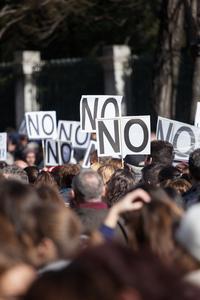Curfews and Protesters’ Rights in Illinois
 Protesters and police have always had something of an uneasy relationship. On the one hand, protecting people's right to freedom of speech is a valuable. On the other, maintaining public order is also important, both for the safety of the people in the protests as well as other people in the area. A case involving the arrests of protesters comes down squarely on the side of the public order. The case involves numerous defendants who were arrested for a curfew violation in Grant Park, who were arguing that the enforcement of the curfew violated their First Amendment rights.
Protesters and police have always had something of an uneasy relationship. On the one hand, protecting people's right to freedom of speech is a valuable. On the other, maintaining public order is also important, both for the safety of the people in the protests as well as other people in the area. A case involving the arrests of protesters comes down squarely on the side of the public order. The case involves numerous defendants who were arrested for a curfew violation in Grant Park, who were arguing that the enforcement of the curfew violated their First Amendment rights.
The Case
This case actually does not have to do with the recent wave of protests across the country, though it may have important implications for future cases surrounding them. Instead, this case goes back to 2011 and the Occupy protestors. On October 15, 2011, Occupy Chicago held a rally, that culminated in a march to Grant Park. Once the protesters reached grant park, they began putting up tents. The police issued warnings that the park closed at 11 p.m., and that people still in the park after that time may be arrested.
While some people left the park at closing time, others chose to stay. The police gave the protesters two more hours before moving in, at which time each protester was offered a choice, leave or be arrested. A similar thing happened the next week. All told, around 300 protesters were arrested. They argued that these arrests violated their constitutional rights under the First Amendment.
The Constitutional Issue
The arrested protestors put forward a Constitutional argument about why the curfew law was invalid. The protesters made a First Amendment argument that the curfew violated their rights to free speech and free assembly because it was preventing them from speaking and assembling in the park after 11 p.m. The appeals court ruled that the curfew was not a First Amendment violation because it was a "content neutral" restriction.
Content neutral restrictions are restrictions on speech that do not have anything to do with the content of the speech, like a law forbidding people from using megaphones past a certain hour. Content neutral restrictions may still be unconstitutional, but they are subject to a less exacting standard of scrutiny than laws regulating speech based on its content or viewpoint.
Ultimately, the appeals court determined that the government had substantial interests in keeping the park closed for certain hours each day to maintain it and keep public order. This interest was enough to justify the restriction in light of the fact that the protesters still had many other ways in which they could express themselves.
Criminal sanctions surrounding protests often include such complicated balancing of interests. If you have recently been arrested at a protest of for some other reason, contact an Elgin criminal defense attorney today.







